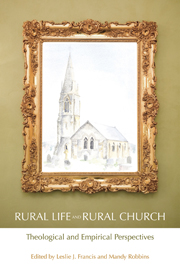Book contents
- Frontmatter
- Contents
- Preface
- Foreword by The Bishop of Shrewsbury, The Rt Revd Mark Rylands
- 1 Introduction: shaping rural theology
- PART 1 PERSPECTIVES FROM THE BIBLE
- PART 2 PERSPECTIVES FROM ORDINARY THEOLOGY
- 5 Ordinary theology for rural theology and rural ministry
- 6 The kneelers are most impressive: reflections on reading a visitors' book
- 7 Ordinary prayer and the rural church: an empirical study of prayer cards
- PART 3 THEOLOGICAL AND SOCIOLOGICAL PERSPECTIVES
- PART 4 HISTORICAL PERSPECTIVES
- PART 5 LISTENING TO VISITORS
- PART 6 LISTENING TO THE COMMUNITY
- PART 7 LISTENING TO CHURCHGOERS
- PART 8 LISTENING TO CHURCH LEADERS
- PART 9 SATISFACTION AND STRESS IN MINISTRY
- Contributors
- Sources
- Subject Index
- Name Index
5 - Ordinary theology for rural theology and rural ministry
from PART 2 - PERSPECTIVES FROM ORDINARY THEOLOGY
- Frontmatter
- Contents
- Preface
- Foreword by The Bishop of Shrewsbury, The Rt Revd Mark Rylands
- 1 Introduction: shaping rural theology
- PART 1 PERSPECTIVES FROM THE BIBLE
- PART 2 PERSPECTIVES FROM ORDINARY THEOLOGY
- 5 Ordinary theology for rural theology and rural ministry
- 6 The kneelers are most impressive: reflections on reading a visitors' book
- 7 Ordinary prayer and the rural church: an empirical study of prayer cards
- PART 3 THEOLOGICAL AND SOCIOLOGICAL PERSPECTIVES
- PART 4 HISTORICAL PERSPECTIVES
- PART 5 LISTENING TO VISITORS
- PART 6 LISTENING TO THE COMMUNITY
- PART 7 LISTENING TO CHURCHGOERS
- PART 8 LISTENING TO CHURCH LEADERS
- PART 9 SATISFACTION AND STRESS IN MINISTRY
- Contributors
- Sources
- Subject Index
- Name Index
Summary
Abstract – In this article the author describes and defends the notion of a non-technical ‘ordinary theology’, and argues for its role as an originating source for both academic theology and official ecclesiastical theology. He relates these claims to one way of interpreting the category of ‘rural theology’, and identifies rural ministry as a context in which ordinary theology may be discerned most clearly and explored most successfully.
Introduction
What is rural theology? I suspect that it is too early to say, and that we shall have to wait for the publication of more books and articles that will help to exemplify and identify the subject. Most academic subjects are as a matter of fact best defined ostensibly, by pointing out the concrete manifestations of their study. This is surely as true of theology as it is of philosophy, which was once defined by G.E. Moore by pointing to the books on his shelves with the words, ‘It is what all these are about.’
It does not yet appear what rural theology will be. Quite properly, it will be interpreted by some as the application of theology, itself a multi-disciplinary entity, to the area – or (happily) ‘field’ – of rural life and society, and their particular concerns. Some might therefore prefer to speak about a ‘theology of the countryside’ or ‘theology and the countryside’, focusing their theology on rural issues and the rural context. But such a theology of context and concern is likely to generate a particular theological style, framework, pattern and procedure: in short, a theological viewpoint or perspective that may later be used to examine other contexts and other issues.
- Type
- Chapter
- Information
- Rural Life and Rural ChurchTheological and Empirical Perspectives, pp. 42 - 51Publisher: Acumen PublishingPrint publication year: 2012



